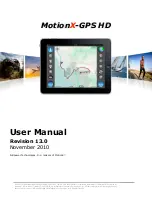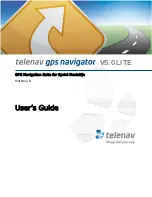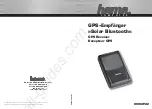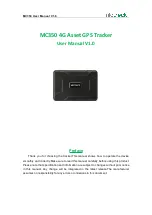
52
GPSMAP 2106/2110 Owner’s Manual
M
AIN
M
ENU
>
DSC (D
IGITAL
S
ELECTIVE
C
ALLING
) T
AB
DSC (Digital Selective Calling) Tab
Use the DSC tab to control and set up DSC features on the GPSMAP 2106/2110.
DSC uses marine VHF radio and GPS technologies to transmit and receive
location information. DSC is used by mariners for two major operations—distress
calls and position reporting.
For more information about DSC and Maritime Mobile Service Identity (MMSI)
numbers, see page
85
When the GPSMAP 2106/2110 is connected to a VHF radio with DSC support,
the GPS unit displays a call list, log, and a directory that stores incoming
information received from another user’s DSC-capable VHF/GPS combination.
Basic wiring is required for the Garmin unit and VHF radio to send and receive
NMEA data from each other. See the
GPSMAP 2106/2110 & GPS 17 Installation
Instructions
for more information.
Understanding DSC Distress Calls
With your GPSMAP 2106/2110 properly connected to a VHF radio with DSC
output, you can receive any DSC distress call within range. An alert message
appears, and an alarm sounds (if enabled) when a distress call is received. The
alarm sounds only for a distress call; position reports do not sound an alarm.
Distress calls are broadcasted to all DSC users in radio range and appear with a
blue and white checkered icon on the DSC tab’s Call List and Log sub tabs.
You can enter a caller’s name, if it is known. The caller’s name replaces the
MMSI number as a reference, when entered.
Understanding Position Reports
The position report operates similarly to the distress call. This type of contact is
like a phone call; no emergency alarms are set off, and the call is specific to the
receiver. Position reports are not broadcasted to all DSC users and appear with a
gold boat icon.
Call List Sub Tab
The Call List sub tab shows the 100 most recent calls, even if the unit is left
unattended. You can select any entry from the Call List to show an Entry Review.
Log Sub Tab
When DSC calls are received, they are automatically stored in the log, with
the latest call at the top. The unit can store up to 100 calls; after 100 calls are
received, the oldest is removed when a new call is received.
The Call List and Log sub tabs both show the call type, date/time, position, and
MMSI/Name. Pressing the Sort By (Call) Type, Sort By Time, Sort By Name,
Delete (only after highlighting a particular call), and Delete All soft keys allows
you to sort and delete calls.















































